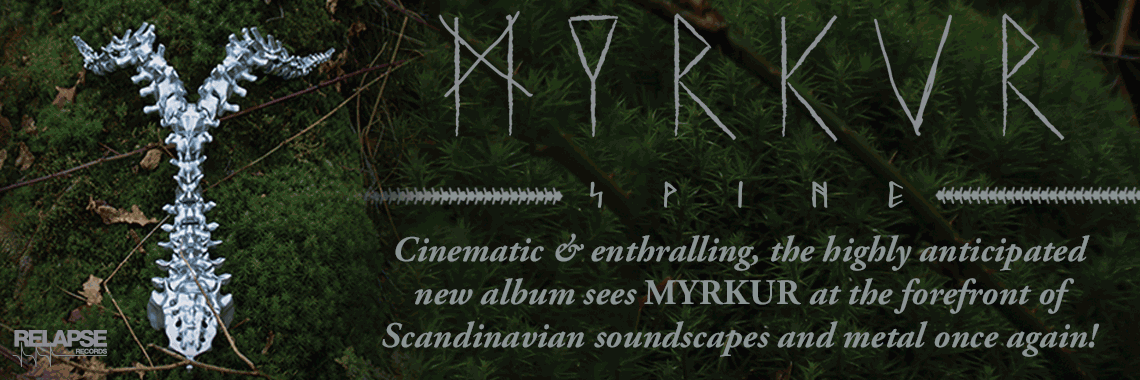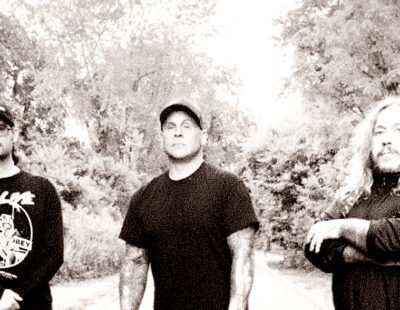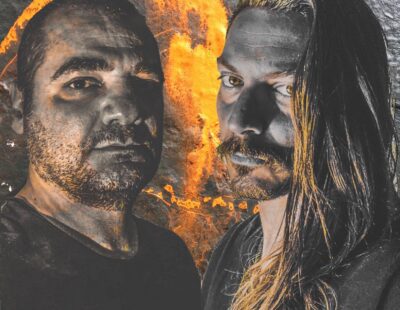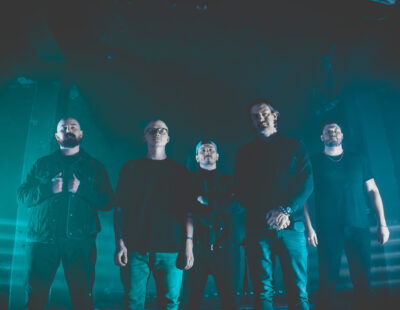
We at Decibel are pretty much always up for more Maiden or Priest. Really, always, to be fair. The same applies to old school death metal. Now what if a particular, vile entrepreneur of a death metal vocalist sought to bring his throat-shredding style to some of our favorite tracks by the aforementioned two essential bands?
Why such would be a graveyard rendition of classics. Or perhaps even a series of such – in this case, Six Feet Under’s Graveyard Classics IV: The Number of the Priest, consisting of five Judas Priest covers and six Iron Maiden tracks selected by Metal Blade CEO Brian Slagel. Tracklist:
1. Night Crawler
2. Starbreaker
3. Genocide
4. Invader
5. Never Satisfied
6. Murders in the Rue Morgue
7. Prowler
8. Flash of the Blade
9. The Evil That Men Do
10. Stranger in a Strange Land
11. Total Eclipse
We got in touch with Chris Barnes, the man behind such lyrical assaults on sensibility and decency as depicted throughout the early Cannibal Corpse catalog, for a chat. Click play on “Murders in the Rue Morgue” to listen to a new take on a metal essential while reading below on his opinion on the series, his approach to making records, the upcoming SFU album of new material, touring, and even a bit of politics. Graveyard Classics IV: Number of the Priest will be released May 27th and is available for pre-order now.
What about the Graveyard Classics series keeps bringing you back to it?
I just like playing cover songs. It’s a lot of fun.
This entry in the series consists of Priest and Maiden tracks. Why those two in particular?
Just an idea I had awhile back, that if I was going to do another Graveyard Classics it was going to have to be something interesting, and I figured a split LP of my two favorite metal bands would be suiting for another Graveyard Classics.
The promo email said Brian Slagel picked the tracks. Which ones are you most excited about?
Brian picked the tracks, yep. I just wanted a different point of view. I picked almost all the cover songs we’d done [previously]. Brian’s a big Maiden and Priest fan, like myself, probably more so, and it felt like he would have some cool suggestions. And he did. All the songs are really interesting. I think they all turned out pretty cool.
With adapting them to your style, do you find it difficult to switch how the vocals were originally over into more of a death growl style?
No, because that’s just how I sing. I just sing the words how I feel them. I don’t try to do anything that’s not me, you know? I’m not going to try to sing like Rob Halford or Paul Di’Anno or Bruce Dickinson, because that’s not how I sing. I look at vocalizing in a band and to a music as more an extension of yourself.
In the past you had ran into difficulty with people always asking about vocals effects used. Do you run into that still?
No, not really. I think that back then with Butchered at Birth and Tomb of the Mutilated I put that on there, I’m not sure if I had that on The Bleeding either, but it was a new style of music. People weren’t used to that new style of singing yet, and most of the people thought it was fake, especially when we placed live shows. People always thought I was using a harmonizer when we were playing live, so when I kind of got wind of that I put that on the record just to make sure that people knew that was a natural voice, that it wasn’t manipulated. But no, not too often, maybe once in a while someone that’s new to the music might say ask that question, but not often.
Do you have any other specific tracks or bands that you would be looking to do another entry into the Classics series with?
I’m not really thinking of that right now, kind of working on new material. Kind of just take it step by step, so if another cover opportunity comes up, or to do another cover song on an album, I’m open to that, I’m sure that there’s plenty of stuff we can lend our sound to.
You mentioned new material, how’s that looking?
Looking great, really. Good stuff coming about, the writing sessions, and demoing out material. I’m very excited about that.
Crypt of the Devil got some really positive response and did well on the Billboard charts — is the new material a similar approach?
The last three albums did really well. I’ve been able to work with some excellent musicians, and some great writing partners over the last three albums, so I’ve been lucky on that side of things. As far as sound wise, I really don’t like to write the same album twice. I’ve never been a fan of just pigeonholing myself into a certain style of music. I always want everything to have its own personality, and I know a lot of people like to say that, but I think you should look at my discography all the way through. Every record has its own sound and stands aside from each other, so this one’s going in that direction as well. It’s different, and exciting and fresh to me. That’s how I like to keep the music because it keeps me excited as a writer.
Was there any specific different direction that you’re pursuing with the new material?
I don’t want to give up to much. It’s super super heavy. We’re concentrating on tempo a lot, and trying to tap in to a certain tempo and time phrasings that cause involuntary movement. [Laughs].
Before you had mentioned that you wrote lyrics after music was written. Is that still the approach you use?
Yeah, once in a while I’ll have maybe an idea or a song title that I’ll gravitate towards when I hear the music, that I’m going to start writing lyrics to, but for the most part 99% of it is written to the music after I have a demo track or a final mix or something like that.
Has your lyrical approach or inspiration changed a lot?
No, I think my approach has always been take it one song at a time, one riff at a time, and try to accommodate the music the best I can with the energy it’s producing me and showing me, as far as my vocal approach, and also the movement of the story itself, and how it’s told, and at what rate. I always rely on the music to lead me through it. The approach is really the same physically – I sit down and try to put myself into almost like a dream state when I’m listening to the music over and over. That’s how I’ve always worked with music, and tried to imagine what it all feels like to me. Since day one that’s where I’ve gained all my inspiration, through the music itself.
Can you tell a little about who is [playing] on the new record without giving too much away?
Right now, myself and Jeff Hughell, my bass player, are writing the whole album.
You mentioned you try to do something different with each record, yet it’s all in the greater death metal realm. Why is it that death metal has kept your attention for so long?
That’s interesting. I guess I have a different perspective on it than most. I understand it as being death metal, but I don’t try to keep myself in that perception of what other people think it is. I really try to just make music or be involved with music and write lyrics and vocals that interest me. I’ve always been able to get my, I guess you can call it art, or frustration out, through this means, with some great musicians, or people that are excited to work with me. And I’m excited to work with them as well. That’s what keeps me interested, something I truly enjoy doing. If other people want to view it as “oh, that’s death metal, or heavy metal, or groove metal, or death groove,” however it’s labeled off and partitioned, it’s cool to me. I don’t really pay attention to that. I pay attention to the people in front of me at a live concert that have a smile on their face. That’s really the only thing that I worry about when it comes down to it. And myself being really happy with all that I do, because I’m a stickler when it comes to putting stuff out. If I didn’t think something was good, or like it myself, I wouldn’t let it be released. I try to do my best at keeping myself guessing, and keep myself satisfied, and this style of music, or what I particularly do with my voice, and have fun with guys playing music, it’s interesting to me. It’s still as interesting as it was in 1988.
So it sounds like you’re saying you don’t get too caught up with labels on things.
Yeah, just what I do. That’s always what it’s been about. “Do I like this? Yeah.” Well, then that’s all that matters. All you have in your life is yourself. You don’t have anything other than that when it all comes down to it. I like doing this. It’s an exploration for me. It’s life, it’s some kind of puzzle. It’s never ending.
Can I anticipate seeing a lot of covers on a standard Six Feet Under set?
We’re going to be doing a special tour over in Europe in the end of June/beginning of July and it’s going to be a full cover song set. That’s something we’ve never done before, so it’s going to be a lot of fun.
What motivated the choice to do the full cover set?
It’s challenging! A lot of people would think “Oh yeah, you’re just playing other people’s songs,” but I’m not putting myself into the most comfortable of situation on a few different levels. I’m always up for a challenge. It’s something that’s different, like we were just talking about. I feel that when something has never been done, or I’ve never done something, it kind of points me in the direction [as if] someone was taunting me. I just want to prove them wrong, or prove to myself that I can take on a situation I’m not comfortable in and have success at it, hopefully.
Would you typically work a significant amount of cover songs into sets previously?
It’s usually about two songs, here or there, maybe three songs, that we’ll throw into a live set. On the last tour, we did “Death or Glory” and we were going to do “War Machine,” but I think we did something else though. Now and then we’ll rotate some cover songs in the set. It’s fun to do that, and the crowd reacts intensely, because you don’t really get to hear those often, so when we play them it’s a good time.
It seems like people get pretty into the cover songs then life, yeah?
Yeah, I think so.
Any plans to do a US tour with the cover set?
They’re working on trying to put stuff together, but it’s been kind of difficult to get a US tour together. It’s just been weird as far as booking agents, I’ve been kind of in between things. We’re working on it though.
How do things seem now in comparison to the earlier days of Six Feet Under in terms of booking the tours?
I think it’s definitely difficult, it’s always difficult to try to make things work financially. The way things are for everybody, and the uncertainty of the music industry, I think that’s taken its toll on us here in this country. It’s tough to keep up the touring schedule like we used to, because it doesn’t get any easier economically.
Do you feel like the scene is more receptive to new stuff [nowadays]?
I don’t know about the scene too much, as far as outside of my own fans. I kind of have an idea of things, but I’m not an avid follower of a lot of the new bands out there, so I know that there’s a lot of the same thing being done, from what I’ve heard, and there’s a lot of trendiness to things. That’s cool I guess, but I’m not really into that. As far as how my fans understand what we’re doing, I think that’s always the same. They thrive on what we’re going to do next, and that’s where I’m coming from. I appreciate the similar train of thought. I don’t really worry about scenes, or trying to please. I just want to keep it interesting for myself. If other people dig it, that’s cool, but I know my real fans are going to like what we do no matter what, and they’re going to accept something that’s a little different. They always have. I understood that since day one in Cannibal Corpse; that you never want to do the same thing over and over again. I carried that through Six Feet Under with even our second album Warpath being so different. People slammed me for that. People slammed me for Butchered at Birth. I remember Kerrang! giving me horrible reviews on my vocals on that album. I just never put too much into what other people thought about what I did, or what the bands I was with did, if it was different or not, because it’s like there’s two separate worlds. There’s what the press promotes, and what reality is, as far as when you’re at a show, on the stage, and there’s people in front of you reacting to your music. Similar to how the news promotes certain individuals running for president, but there’s this other guy that’s not on the news, but that’s always there, always has people at his rallies, always has his supporters that no matter what they follow him. I look at things in that kind of way – what’s really behind the whole thing?







